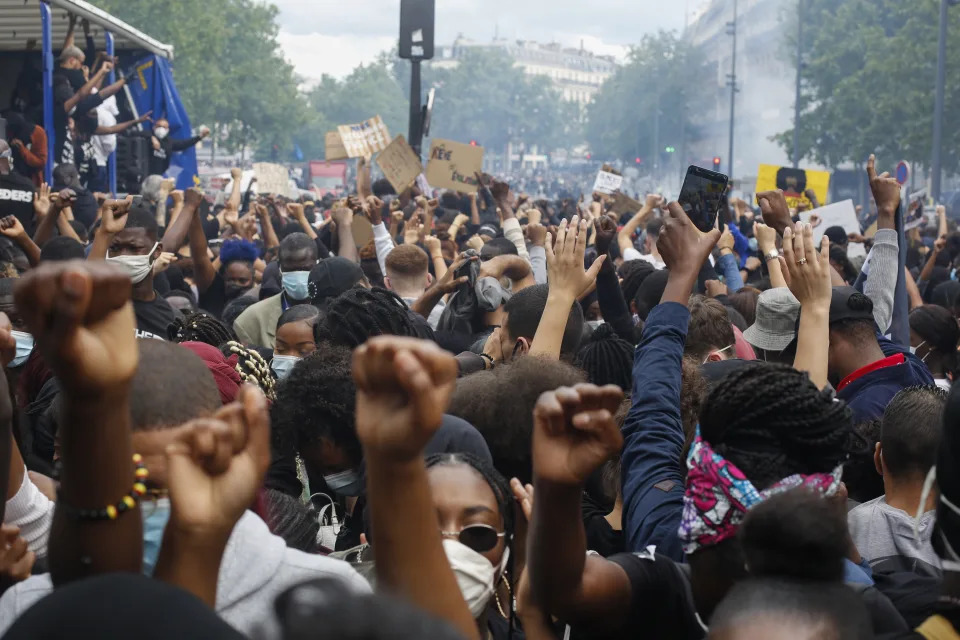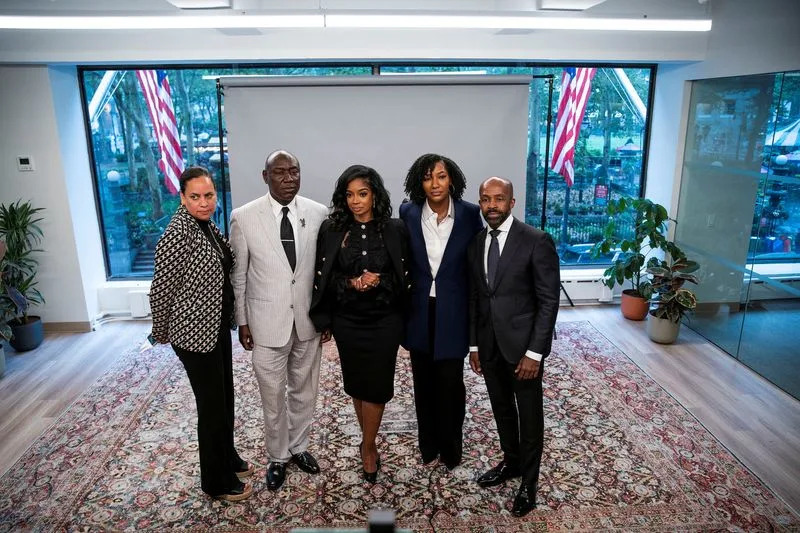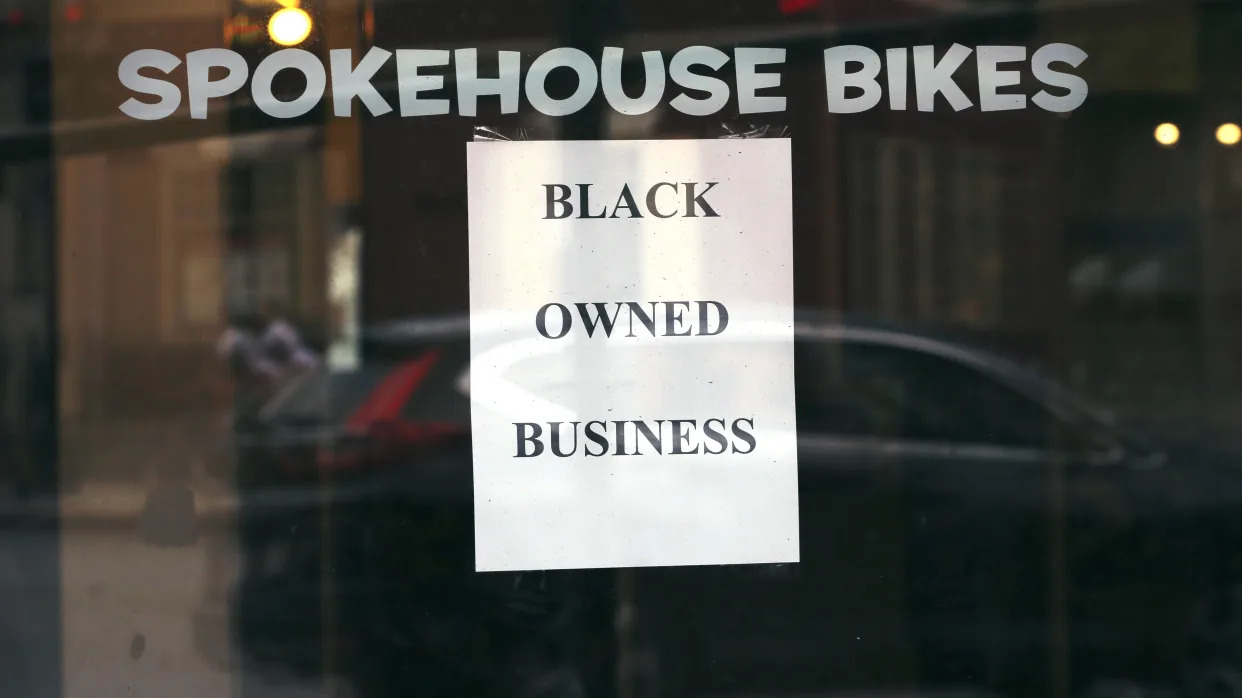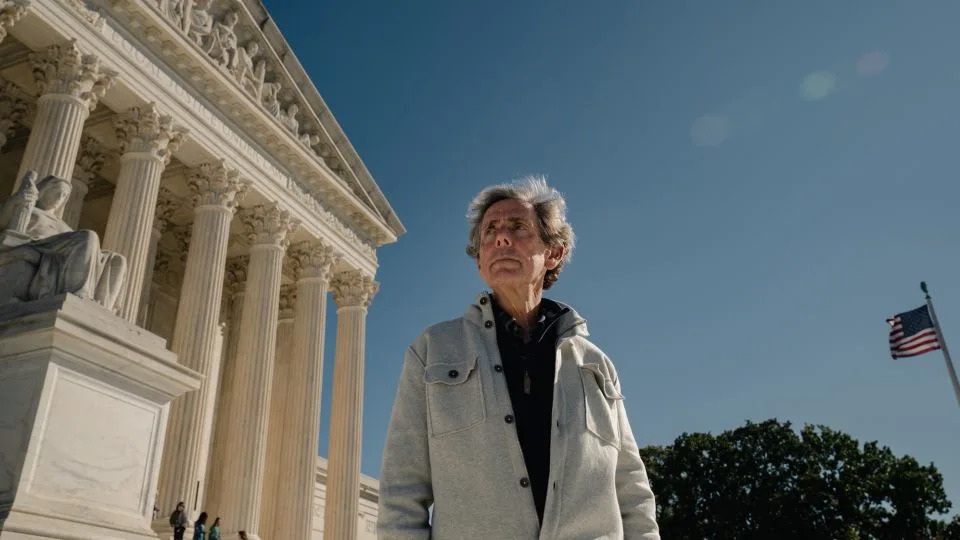Updated Sat, September 30, 2023

A sign outside the Guru Nanak Sikh Gurdwara temple is seen after the killing on its grounds in June 2023 of Sikh leader Hardeep Singh Nijjar, in Surrey
By Steve Scherer
OTTAWA (Reuters) -Canadian Sikhs are grateful to Prime Minister Justin Trudeau for giving voice to their fears and standing up to India at the risk of severe backlash from New Delhi, which he said could be linked to the murder of a Sikh separatist leader.
The Indian government considered Hardeep Singh Nijjar, a Canadian citizen who was shot to death in June in British Columbia (BC), a terrorist because of his advocacy for Khalistan, an independent Sikh state.
India forcefully denied its involvement in Nijjar's murder, which took place in the parking lot of a Sikh temple in Surrey, BC. But Canadian Sikhs are unconvinced, and the minority who are active proponents of Khalistan are afraid.
"There's a lot of fear," said Sentokh Singh, who was among the small group who protested in front of the Indian High Commission (embassy) in Ottawa this week. "That's why we are here today."
Both countries expelled diplomats in a tit-for-tat retaliation after Trudeau's bombshell announcement last week, but India has gone further, issuing a travel warning and halting visa issuance to Canadians.
Trudeau's move risks derailing a strategic economic and political shift many Western countries are making towards India to counter China. It also distracted attention from his push to address cost-of-living concerns, which have weighed heavily on his popularity in opinion polls.
Canada is home to about 770,000 Sikhs, the highest population outside the northern Indian state of Punjab, and the Indian government has for decades expressed its displeasure with some community members' outspoken support for Khalistan.
Sikhs punch above their weight in Canadian politics. They have 15 members in the House of Commons, more than 4% of the seats, mostly from key battlegrounds in national elections, while comprising only about 2% of the Canadian population.
Furthermore, one member is Jagmeet Singh, leader of the opposition New Democrats, a left-leaning party that is supporting the Trudeau's minority government.
"In political terms, this is no-brainer: You got to get out ahead of the story and you got to express outrage," said Fen Hampson, professor of international affairs at Carleton University in Ottawa.
Trudeau's "unsubstantiated allegations" seek to shift focus away from "Khalistani terrorists and extremists who have been provided shelter in Canada," India's foreign ministry said.
Canada says Sikhs have a right to peaceful protest and there has been no evidence of violence, terrorist activity or wrongdoing.
'RELIEF'
A friend of Nijjar's, Gurmeet Singh Toor, is an active member of the same temple and a Khalistan supporter. He was told in August by the federal police that his life might be "in peril", according to a document he was given by police that provided no details about the potential threat.
The RCMP would not corroborate the document, saying it could increase the risk to the individual who received it.
An insurgency seeking a Sikh homeland of Khalistan killed tens of thousands in the 1980s and 1990s and was crushed by India. It has almost no support in Punjab today.
However, on Friday hundreds of Sikh activists staged a demonstration outside the Golden Temple in Amritsar, in Punjab, demanding punishment for the Nijjar's killers.
Mukhbir Singh, a member of the Ottawa Sikh Society, said Canadian Sikhs' views on Khalistan vary and everyone should be able to express their own opinion. He said Trudeau is sticking up for Canadian democratic values.
"Prime Minister Trudeau has taken a stance" to make "paramount" the safety of its citizens, he said, even though the Canadian government does not support Khalistan. "In Canada, we have the right to express our opinions even if they don't align with the opinions of the government."
Trudeau, the longest serving progressive leader in the G7 group of wealthy nations, is trailing badly in opinion polls. As he rolls out a series of measures to address cost-of-living concerns and try to claw back support, the tensions with India have interfered with attempts to communicate those new policies, senior officials in Ottawa said.
Suk Dhaliwal, a Sikh Liberal member of parliament for Surrey, told Reuters he is not a Khalistan separatist, but a Canadian, and Canadians have a right to protest peacefully. He said his constituents have suspected since June the involvement of the Indian government in the murder.
"The community feels a bit relieved now that at least there is someone who has shown leadership to bring this message forward," Dhaliwal said.
(Reporting by Steve Scherer; Additional reporting by Wa Lone in Toronto; Editing by Denny Thomas and Daniel Wallis)
India’s foreign affairs minister has accused Canada of creating a “climate of violence” and an “atmosphere of intimidation” against Indian envoys working in Ottawa amid tensions between the nations continuing to spiral over the murder of a Sikh separatist leader.
The comments come as there seem to be no signs of thawing in Indo-Canadian relations after prime minister Justin Trudeau earlier this month accused government agents of India of being involved in the murder of Hardeep Singh Nijjar, who India had labelled a “terrorist”.
On Friday evening in Washington, Indian foreign minister S Jaishankar came down heavily on Canada even as he said India would be open to looking at evidence.
“Because there is freedom of speech, to make threats and intimidate diplomats, I don’t think that’s acceptable,” Mr Jaishankar said.
Canada has a “permissive attitude towards terrorists, extremists, and people who openly advocate violence”, he said in response to a question at an event in the Hudson Institute.
“They have been given operating space in Canada because of the compulsions of Canadian politics,” he said.
He said Delhi views Canada as a country where “organised crime from India has mixed with trafficking in people, secessionism, violence, terrorism”.
Ottawa has not issued a response to Mr Jaishankar’s remarks, which were made about the presence of Sikh separatist groups abroad that advocate for a separate homeland from India’s Punjab state called Khalistan – something that has not gone down well with New Delhi.
The minister, however, claimed the Narendra Modi administration is not shutting doors on Canada over the recent charges claiming India’s involvement.
“If there is a requirement for us to look at something, we are open to looking at it. But, I then expect somewhere, some pointer, something for me to look at,” he said.
Mr Trudeau, who is yet to publicly share any evidence, said last week he shared the “credible allegations” with India “many weeks ago”.
The issue of the separatist Khalistan movement has been a persistent thorn in the diplomatic ties between the two countries.
Earlier this month, Mr Trudeau sent shockwaves after he alleged Indian agents may have had a role in the June murder of Sikh separatist leader and Canadian citizen Hardeep Singh Nijjar.
India had labelled Nijjar an “independent terrorist” before he was killed.
While New Delhi dismissed the allegations of its involvement in the murder as absurd, reports claimed intelligence was shared between Canada and its Five Eyes allies on the matter and also shared with Indian officers during the G20 summit.
Washington has urged India to cooperate with Canada in the murder probe.
The demand for Khalistan has surfaced many times in India, most prominently during a violent insurgency in the 1980s and 1990s, which had paralyzed Punjab for over a decade.
India has dubbed the Khalistan movement a security threat.
Extremists ‘given operating space in Canada,’ says Indian minister
Vedika Sud, Sahar Akbarzai and Chris Lau, CNN
Fri, September 29, 2023

Drew Angerer/Getty Images
An Indian minister has accused Canada of giving “operating space” to terrorists and extremists, as he rejected claims by Prime Minister Justin Trudeau that the Indian government may have played a role in the assassination of a Sikh separatist on Canadian soil.
“The Canadian (prime minister) made some allegations initially privately, and then publicly. And, our response to him, both in private and public, was that what he was alleging was not consistent with our policy,” India’s Minister of External Affairs Subrahmanyam Jaishankar said during a discussion at the Hudson Institute in Washington D.C. on Friday.
The minister said India was “open to” further examine the event if the Canadian government “had anything relevant and specific they would like us to look into,” but added that the row between the countries preceded Trudeau’s allegations.
Relations between the two nations took a nosedive last week after Trudeau claimed his authorities had been investigating “credible allegations” of a potential link between “agents of the government of India” and the killing of Hardeep Singh Nijjar, an outspoken supporter of the creation of Khalistan – a separate homeland for the Sikhs that would include parts of India’s Punjab state.
India considers calls for Khalistan a grave national security threat. However, it has vehemently denied Trudeau’s claims, calling them “absurd and motivated,” and the growing spat has seen both countries expel each other’s diplomats.
But Jaishankar said on Friday that the differences went back further than the row over Nijjar’s death. He said the Indian government had long accused Canada of inaction in dealing with Sikh separatist extremism aimed at creating a separate Sikh homeland.
He said India believes Canada has a “very permissive Canadian attitude towards terrorists, extremist people who openly advocate violence.”
Those individuals “have been given operating space in Canada because of the compulsions of Canadian politics,” Jaishankar added.
Nijjar’s death shocked and outraged the Sikh community in Canada, one of the largest outside India and home to more than 770,000 members of the religious minority.
A number of groups associated with the idea of Khalistan are listed as “terrorist organizations” under India’s Unlawful Activities (Prevention) Act (UAPA), though several Sikh organizations abroad have accused the Indian government of falsely equating them with terrorism.
Nijjar’s name appears on the list of UAPA terrorists and in 2020, the Indian National Investigation Agency accused him of “trying to radicalize the Sikh community across the world in favor of the creation of Khalistan.”
The US position
Jaishankar met US Secretary of State Antony Blinken at the State Department on Thursday.
The two diplomats made no comments during a brief photo-op ahead of the meeting. However, a State Department spokesman said Friday that Blinken urged his Indian counterpart to cooperate fully with the ongoing Canadian investigation into the killing.
The US ambassador to Canada confirmed that intelligence gained by the “Five Eyes” network, which includes the US, Canada, Britain, New Zealand and Australia, led to Canada’s public accusation that the Indian government may have played a role in the death of Nijjar.
At a different press conference Friday, Blinken said that those responsible for the murder of a Sikh activist in Canada “need to be held accountable.”
“We have engaged with the Indian government and urged them to work with Canada on an investigation, and I had the opportunity to do so again in my meeting yesterday with Foreign Minister Jaishankar,” said Blinken at a press conference with Commerce Secretary Gina Raimondo, US Trade Representative Katherine Tai, Mexican Foreign Secretary Alicia Barcena and Economy Minister Raquel Buenrostro.
Blinken said he hopes “our friends in both Canada and India will work together to resolve this matter.”
Jaishankar also noted he had spoken with both US National Security Adviser Jake Sullivan and US Secretary of State Antony Blinken about the matter.
“They obviously shared US views and assessments on this whole situation,” Jaishankar said. “So I think hopefully we both came out of those meetings better and forward.”
“Today, I’m actually in a situation where my diplomats are unsafe going to the embassy, or to the consulate in Canada. They are publicly intimidated. And that has actually compelled me to temporarily suspend even visa operations in Canada,” the minister added.
Canadian police have not arrested anyone in connection with Nijjar’s murder.
But in an August update, police released a statement saying they were investigating three suspects and issued a description of a possible getaway vehicle, asking for the public’s help





























